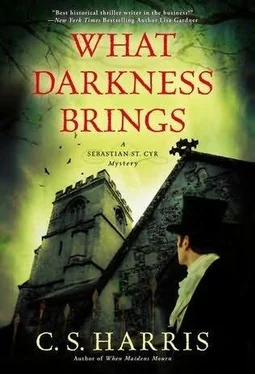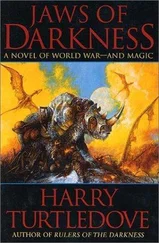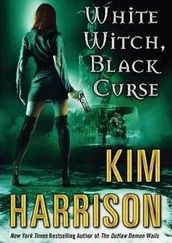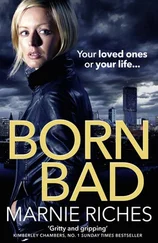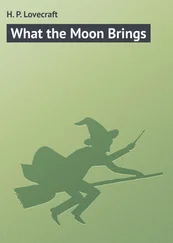C. Harris - What Darkness Brings
Здесь есть возможность читать онлайн «C. Harris - What Darkness Brings» весь текст электронной книги совершенно бесплатно (целиком полную версию без сокращений). В некоторых случаях можно слушать аудио, скачать через торрент в формате fb2 и присутствует краткое содержание. Жанр: Исторический детектив, на английском языке. Описание произведения, (предисловие) а так же отзывы посетителей доступны на портале библиотеки ЛибКат.
- Название:What Darkness Brings
- Автор:
- Жанр:
- Год:неизвестен
- ISBN:нет данных
- Рейтинг книги:3 / 5. Голосов: 1
-
Избранное:Добавить в избранное
- Отзывы:
-
Ваша оценка:
- 60
- 1
- 2
- 3
- 4
- 5
What Darkness Brings: краткое содержание, описание и аннотация
Предлагаем к чтению аннотацию, описание, краткое содержание или предисловие (зависит от того, что написал сам автор книги «What Darkness Brings»). Если вы не нашли необходимую информацию о книге — напишите в комментариях, мы постараемся отыскать её.
What Darkness Brings — читать онлайн бесплатно полную книгу (весь текст) целиком
Ниже представлен текст книги, разбитый по страницам. Система сохранения места последней прочитанной страницы, позволяет с удобством читать онлайн бесплатно книгу «What Darkness Brings», без необходимости каждый раз заново искать на чём Вы остановились. Поставьте закладку, и сможете в любой момент перейти на страницу, на которой закончили чтение.
Интервал:
Закладка:
“You can’t be serious,” said Sebastian.
Francillon sighed. “I wish I were not. They were finally spotted by an officer of the National Guard, who sounded the alarm. But it took him so long to convince the building’s watchmen to open the chamber’s doors-which were, of course, still sealed-that the thieves managed to escape.”
“You’re saying none of them were caught?”
“One or two who were too drunk or too stupid to run were taken up at the scene; a few more were arrested later. But none of the actual ringleaders were ever apprehended. In the end, several men were executed. A few were given short prison sentences and then quickly pardoned.”
“That sounds rather suspicious.”
“It does, does it not?” Francillon cleared his throat. “At the time, the public was naturally outraged by the theft of the nation’s treasure. Some tried to place the blame for the theft on the Queen, Marie Antoinette-which was ridiculous, given that she was under guard herself at the time. Others thought it was a counterrevolutionary plot to destroy the Revolution by stealing France’s wealth. But there were those who suspected that forces within the revolutionary government itself had been responsible. You see, the Minister of the Interior had actually suggested back in August that the Crown Jewels be sold and the proceeds used to support the Revolution’s paper currency and defray other expenses-in particular the looming war with Austria and Prussia. But there was such an outcry that the scheme was abandoned.”
“At least publicly,” said Sebastian.
Francillon met his gaze, his expression solemn. “Exactly.” His eyes slid away. “One interesting point is that the thief who is credited with devising the scheme in the first place-Paul Miette-was actually imprisoned in La Force until shortly before the theft, as were nearly a dozen of his colleagues. There have been suggestions that their release was arranged by men within the government.”
“You say Miette was never captured?”
“Never. He simply disappeared. Some of the smaller stones were recovered in Paris in the days and weeks following the theft. But the major pieces-the French Blue, the Bazu, and many, many others-have never been seen again.”
“Do you know the names of any of Miette’s colleagues?”
Francillon frowned with the effort of memory. “Let me see. . There was Cadet Guillot; he is probably the best known, along with a man named Deslanges. And, of course, Collot.”
“Collot?” said Sebastian sharply. “You mean Jacques Collot?”
Francillon looked at him in surprise. “You have heard of him?”
“I have. He claims he comes from a long line of Parisian lapidaries.”
Francillon threw back his head and laughed. “I suppose he can certainly claim to come from a long line of ancestors with a marked interest in jewels. But I’m afraid the Collots’ talents have never been those of a lapidary.”
“Meaning?”
“The Collots are thieves,” said Francillon, his lean features hardening. “And they have been for a hundred and fifty years or more.”
Sebastian was in his dressing room rubbing ashes into his face when Hero came to stand in the doorway behind him, the black cat perched regally in her arms.
He looked over at her and smiled. “So, where was he?”
“He’d somehow contrived to get himself shut in the tack room in the stables.”
“Someone needs to tell him about curiosity and the cat.”
With a contemptuous lashing of its long, fluffy tail, the cat jumped from her arms and ran off. “I did,” she said. “He didn’t appreciate it.”
She brought her gaze back to his worn breeches and leather waistcoat, the disreputable coat and grimy shirt gleaned from the secondhand clothing stalls in Rosemary Lane. He’d also wrapped padding around his waist that effectively altered both his silhouette and his gait. “Do I take it you’re not planning an evening at your club?”
He leaned forward, his gaze on the mirror as he dabbed more ashes mixed with grease from the kitchen onto the dark hair at his temples. “I’ve just had an interesting conversation with the lapidary, Francillon.”
“Oh?”
“He tells me there’s a strong possibility the theft of the French Crown Jewels was actually engineered by the revolutionary French government.”
Pushing away from the doorframe, she wandered the room, fiddling first with a box of collars, then with one of the ragged coats Calhoun had assembled for Devlin’s selection. “What makes you so certain this blue diamond is in any way connected to Eisler’s death?”
“At this point, I’m not certain it is. I’m also hearing credible stories about the man’s cutthroat lending practices and certain aberrant sexual practices that could very well be what ended up getting him killed.”
She glanced over at him. “Define ‘aberrant.’”
“Compelling attractive young women to lie with him when they-or their husbands-fell behind on interest payments.”
A wave of revulsion flickered over her face. “I’d say that goes beyond aberrant, all the way to downright evil. The more I hear about Eisler, the more I think whoever killed him deserves a reward rather than punishment.”
Sebastian wiped his hands on a towel. “I might agree, except for one thing.”
“What’s that?”
“Whoever murdered Eisler is about to let an innocent man hang for what he did.”
“True.” She hesitated a moment, then said, “So why this continuing interest in the French Crown Jewels?”
“Because for some reason, the more I look into Eisler’s affairs, the more the French Blue keeps coming up. It obviously fits into all this somewhere; I just can’t figure out where or how.”
“Which is why you’re dressed like a fat publican down on his luck?”
Sebastian reached for a battered black hat and settled it low on his forehead. “I’ve decided I need to have another conversation with my friend Jacques Collot. A candid conversation.”
Hero smiled. “And what do you expect him to tell you?”
“Mainly, what happened to the French Blue between the time it disappeared from the Garde-Meuble in Paris and when it reappeared in Daniel Eisler’s possession shortly before his death.” Propping one foot on the edge of a bench, Sebastian loosened the dagger he kept in a sheath in his boot, then straightened to slip a small double-barreled pistol into the pocket of his tattered greatcoat. “And maybe-just maybe-where the bloody diamond is now.”
Chapter 31
By the time Sebastian reached the parish of St. Giles, the darkness of the night was complete, the sickle moon and few dim stars that had been visible earlier at dusk hidden now by a haze of coal smoke and scattered clouds. The smell of cook fires and a pervasive dampness left from the day’s rain hung heavily in the air, underlain by the inevitable stench of effluvia and decay. As he paid off his hackney driver, a tousle-haired woman in a tawdry, low-cut red gown emerged from the shadows of a nearby doorway to smile archly. “Lookin’ fer some fun, gov’nor?”
Sebastian shook his head and turned to push his way through the raucous, drunken crowds of costermongers and day laborers, thieves and pickpockets, doxies and beggars, his gaze carefully scanning the sea of rough, dirty faces.
The East End of London was choked with men like Collot: raised in want and desperation, uneducated, angry, and long ago cut loose from the moral underpinnings that typically anchored those who looked askance at them. Most were English or Irish, but in their midst one also found many French, Danes, Spaniards, even Africans. Living precariously from day to day, subsisting largely on potatoes and bread and crammed as many as five or ten to a room, they wreaked their own kind of vengeance on a system that viewed them as a permanent “criminal class,” impervious to improvement and suitable only for containment. Those who didn’t die young or violently could generally look forward to being either hanged or transported to the nasty new penal colony at Botany Bay that had replaced the earlier hellholes in Georgia and Jamaica.
Читать дальшеИнтервал:
Закладка:
Похожие книги на «What Darkness Brings»
Представляем Вашему вниманию похожие книги на «What Darkness Brings» списком для выбора. Мы отобрали схожую по названию и смыслу литературу в надежде предоставить читателям больше вариантов отыскать новые, интересные, ещё непрочитанные произведения.
Обсуждение, отзывы о книге «What Darkness Brings» и просто собственные мнения читателей. Оставьте ваши комментарии, напишите, что Вы думаете о произведении, его смысле или главных героях. Укажите что конкретно понравилось, а что нет, и почему Вы так считаете.
